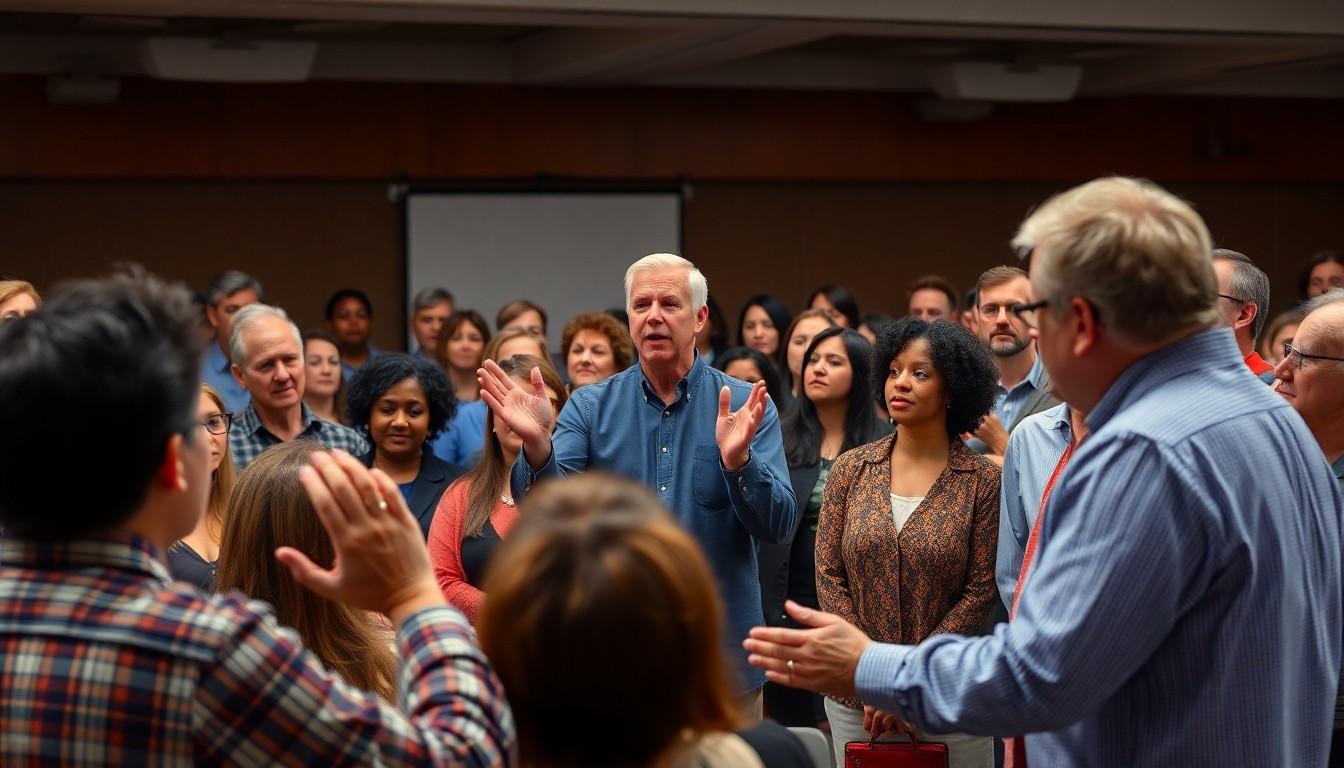Physical Address
304 North Cardinal St.
Dorchester Center, MA 02124

In the bustling world of retail politics, where campaigns often resemble a high-stakes game of Monopoly, candidates are vying for attention like kids in a candy store. This unique blend of consumer culture and political maneuvering transforms the way voters engage with their representatives. Forget the stuffy debates and long-winded speeches; it’s all about charm, charisma, and a killer sales pitch that can sway even the most skeptical shopper.
Retail politics involves the direct engagement of candidates with voters, emphasizing personal interactions over traditional campaign methods. This approach harnesses emotions and relationships to capture voter interest.
Retail politics refers to strategies where candidates connect with voters through grassroots interactions. This process often includes town hall meetings, door-to-door canvassing, and one-on-one conversations. Candidates focus on building trust and rapport, highlighting their personalities to resonate with potential supporters. Such tactics create a more intimate political atmosphere, allowing voters to feel directly involved in the political process.
Retail politics traces its origins to early American electoral practices. In the 19th century, candidates actively participated in local events and gatherings, fostering relationships with constituents. Political figures like Abraham Lincoln exemplified this method, utilizing personal charm and accessibility to rally support. The importance of face-to-face interactions persisted into the 20th century, evolving with technological advancements. As mass communication emerged, candidates adapted their strategies while maintaining the core principles of personal engagement.

Retail politics emphasizes personal engagement between candidates and voters. This method fosters deeper connections that traditional campaigning techniques often lack.
Candidates utilize various strategies to create meaningful interactions. Town hall meetings offer opportunities for direct communication and feedback. Door-to-door canvassing enhances visibility while allowing candidates to address community concerns. Attending local events enables candidates to demonstrate their commitment to constituents. Personal storytelling becomes a powerful tool for candidates, making them relatable to voters. Utilizing social media channels provides additional platforms for candidates to engage, connecting with younger demographics effectively.
Interaction techniques play a crucial role in retail politics. Candidates often use active listening to build rapport with voters. Conducting small group discussions allows for targeted dialogue on relevant issues. Interactive surveys and polls can gauge voter sentiment and preferences. Community service participation shows candidates’ dedication while fostering trust. Utilizing volunteers for grassroots efforts strengthens connections between candidates and voters, enhancing campaign outreach. Frequent follow-ups with constituents after initial meetings demonstrate commitment and accountability, solidifying relationships for future support.
Retail politics significantly influences how voters perceive and engage with candidates. Personal connections often foster loyalty, encouraging voters to support candidates they trust.
Candidates’ personalities and charisma play critical roles in shaping voter behavior. A relatable demeanor can resonate with the electorate, making candidates more approachable. Engaging storytelling helps candidates connect their personal experiences to broader issues, creating a sense of shared values. Voters often remember candidates who exude warmth and authenticity. In addition, personal charisma can overshadow traditional political platforms, swaying undecided voters. Emotional appeals, delivered through genuine conversations, strengthen candidate-voter relations.
Grassroots movements significantly impact voter engagement. Candidates that prioritize local outreach often mobilize passionate supporters. These movements foster community connections, amplifying the voices of everyday citizens. Participation in local events allows candidates to address immediate concerns, showcasing responsiveness. Volunteers form the backbone of these efforts, extending the reach of campaigns. Effective grassroots strategies create trust, as candidates demonstrate commitment to their constituents. Engaging community members in decision-making processes enhances overall campaign credibility.
Retail politics presents multiple challenges that candidates face while engaging voters directly.
Resource limitations significantly impact campaign effectiveness. Funding constraints often restrict the number of events candidates can host. Limited budgets also hinder their ability to hire adequate staff for grassroots initiatives. Volunteers are crucial in these scenarios, yet managing and training them requires additional time and effort. Inadequate resources can lead to lower visibility in communities. Candidates may struggle to reach diverse voter groups without a comprehensive outreach strategy. This situation limits the potential for establishing personal connections, which are essential for success in retail politics.
Changing demographics further complicate retail politics strategies. Voter preferences and communication styles evolve with shifts in community makeup. Candidates must adapt their messages to resonate with various cultural backgrounds and age groups. Younger voters, in particular, favor digital engagement, so reliance on traditional methods may alienate them. Understanding these dynamics is critical for effective outreach. Moreover, demographic changes can create new voting blocs that require tailored engagement strategies. Candidates must prioritize inclusivity to foster connections and gain trust among diverse constituents.
Retail politics remains a powerful strategy in modern campaigns. By prioritizing personal engagement candidates can forge meaningful connections with voters that transcend traditional methods. The emphasis on grassroots initiatives and relatable storytelling fosters trust and loyalty among constituents.
As the political landscape continues to evolve candidates must adapt their approaches to meet the diverse needs of the electorate. Embracing both personal interactions and digital outreach is essential for resonating with younger voters and addressing changing demographics. Ultimately the success of retail politics hinges on a candidate’s ability to connect authentically with the community and demonstrate a genuine commitment to their concerns.